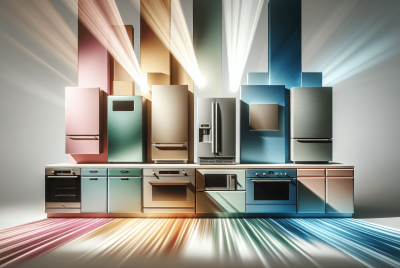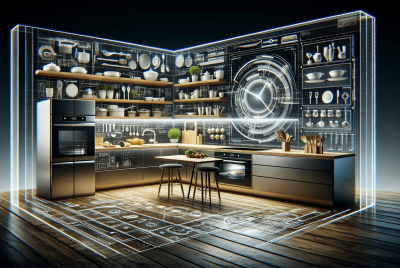What Is The Cost Of Smart Kitchen?
Imagine having a kitchen that effortlessly anticipates your needs and simplifies your daily cooking routines. From voice-controlled appliances to smart refrigerators that make grocery shopping a breeze, the concept of a smart kitchen is undoubtedly intriguing. But with all these advancements, you may wonder, what is the cost of bringing this level of innovation into your home? In this article, we’ll explore the various components of a smart kitchen and shed light on the price range associated with turning your ordinary kitchen into a technologically advanced cooking haven.

Smart Kitchen Basics
Overview of smart kitchen technology
smart kitchen technology refers to the integration of connected devices and appliances in the kitchen to create a more efficient and convenient cooking and dining experience. These devices and appliances are equipped with advanced features and internet connectivity, allowing them to communicate with each other and be controlled remotely. From smart refrigerators that can track inventory and suggest recipes to smart ovens that can be preheated using voice commands, there are a wide variety of smart kitchen devices available on the market.
Benefits of a smart kitchen
The benefits of a smart kitchen are numerous. Firstly, it can make your cooking experience more convenient and efficient. With smart devices, you can easily control and monitor your appliances remotely through smartphone apps or voice commands. This means you can adjust the temperature of your oven, start your coffee maker, or even check the contents of your refrigerator while you’re away from home.
Secondly, a smart kitchen can help you save time and reduce waste. Smart appliances can suggest recipes based on the ingredients you have and provide step-by-step cooking instructions. They can also send notifications when your food is ready or when an ingredient is about to expire. This not only helps you plan meals effectively but also reduces food waste.
Furthermore, a smart kitchen can enhance your energy efficiency and reduce utility bills. Smart appliances are designed to be energy-efficient and can be programmed to run during off-peak hours, when electricity rates are lower. You can also monitor and control the energy usage of your appliances, helping you optimize their performance and reduce unnecessary power consumption.
Types of smart kitchen devices
Smart kitchen devices can be categorized into various types, each serving a specific purpose in the kitchen. Some of the most common types include:
Smart refrigerators
Smart refrigerators are equipped with features such as built-in cameras, inventory tracking, and recipe suggestions. These fridges can take pictures of the contents inside and send them to your smartphone, allowing you to check what you need to buy while at the grocery store. Additionally, they can track the expiry dates of your items and send you reminders to use them before they go bad.
Smart ovens and cooktops
Smart ovens and cooktops offer features like remote control, preheating, and guided cooking. You can preheat your oven using a smartphone app, ensuring it’s ready to use when you arrive in the kitchen. Some appliances also provide guided cooking, where they provide step-by-step instructions on the display or through voice commands, making it easier for you to follow recipes.
Smart dishwashers
Smart dishwashers can be programmed and controlled through smartphone apps. You can schedule your dishwasher to run at specific times or check the status of a wash cycle remotely. Some models even have sensors that detect the dirtiness of the dishes and adjust the water usage and cycle length accordingly, leading to more efficient cleaning.
Smart coffee makers
Smart coffee makers allow you to set brewing schedules, adjust brewing strength, and even control the machine with voice commands. With these devices, you can wake up to a freshly brewed cup of coffee without having to manually prepare it. Some models can also be connected to your smart home system, allowing you to integrate them with other devices or set up routines.
Smart small appliances
Smart small appliances include devices like toasters, blenders, and slow cookers, among others. These appliances can be controlled remotely and offer various features to enhance the cooking process. For example, a smart blender may have preset modes for different recipes, while a smart slow cooker can be adjusted in terms of temperature and cooking time through a smartphone app.
Cost Factors
Initial investment
The cost of setting up a smart kitchen can vary depending on the specific devices and appliances you choose. The initial investment typically includes the purchase of smart appliances, connected gadgets, and integration and control systems. The price of these items can range from a few hundred dollars to several thousand, depending on the brand, features, and quality.
Installation and setup costs
In addition to the cost of the devices themselves, there may be installation and setup costs involved. Some smart appliances may require professional installation, especially if they need to be integrated with your existing kitchen infrastructure or connected to your household’s electrical and plumbing systems. This can incur additional expenses, so it’s important to factor in these costs when budgeting for a smart kitchen.
Maintenance and subscription fees
It’s also worth considering the ongoing maintenance and subscription fees associated with smart kitchen devices. While some appliances may not require any additional fees, others may have optional service plans that provide additional features or technical support. Additionally, software updates and security patches may be necessary to ensure the optimal performance and security of your smart devices.
Smart Appliances
Smart refrigerators
Smart refrigerators offer advanced features such as touchscreen displays, built-in cameras, and Wi-Fi connectivity. The price of these appliances can vary depending on the brand and features, with high-end models typically costing more than budget-friendly options. On average, you can expect to pay anywhere from $1,000 to $5,000 for a smart refrigerator.
Smart ovens and cooktops
Smart ovens and cooktops come in a variety of options, ranging from basic models with remote control capabilities to more advanced ones with voice control and guided cooking features. The cost of these appliances can range from $500 to $3,000, depending on the brand, size, and features.
Smart dishwashers
Smart dishwashers offer convenience features such as remote control, status notifications, and energy usage monitoring. The cost of a smart dishwasher typically ranges from $800 to $2,000, depending on the brand and features.
Smart coffee makers
Smart coffee makers vary in price depending on the brand, size, and features. Basic models with Wi-Fi connectivity can be found for as low as $100, while more advanced ones with multiple brewing options and voice control can cost up to $500.
Smart small appliances
Smart small appliances like blenders, toasters, and slow cookers generally have a lower price range compared to larger smart appliances. Depending on the brand and features, you can expect to pay anywhere from $50 to $300 for a smart small appliance.

Connected Kitchen Gadgets
Smart scales and measuring devices
Smart scales and measuring devices are designed to provide precise and accurate measurements for your recipes. These gadgets can connect to your smartphone or tablet via wireless technology, allowing you to track your cooking progress and make adjustments as needed. The cost of smart scales and measuring devices can range from $20 to $100, depending on the brand and features.
Smart blenders and food processors
Smart blenders and food processors offer features such as pre-set blending modes, recipe suggestions, and Wi-Fi connectivity. The price of these gadgets can vary depending on the brand and size, with basic models starting around $50 and high-end models costing up to $300 or more.
Smart kitchen faucets
Smart kitchen faucets provide touchless operation, water usage tracking, and voice control capabilities. The cost of these faucets can range from $100 to $500 or more, depending on the brand and features.
Smart trash cans and recycling bins
Smart trash cans and recycling bins come with features such as motion sensors, odor control, and automatic bag replacement. The price of these gadgets can range from $50 to $300, depending on the size and features.
Integration and Control Systems
Smart hubs and voice assistants
Smart hubs and voice assistants are central control systems that allow you to connect and control your smart kitchen devices. These systems typically come in the form of a hub or a smart speaker with voice recognition capabilities. The cost of smart hubs and voice assistants can range from $50 to $200, depending on the brand and features.
Smart lighting and power control
Smart lighting and power control systems allow you to control the lights and power usage in your kitchen through smartphone apps or voice commands. The cost of these systems can vary depending on the number of lights and power outlets you want to control, as well as the brand and features. On average, you can expect to pay anywhere from $100 to $500 for smart lighting and power control systems.
Smart security and monitoring systems
Smart security and monitoring systems provide added security and peace of mind for your kitchen. These systems include features such as video surveillance, motion detection, and remote monitoring. The cost of smart security and monitoring systems can range from $200 to $1,000 or more, depending on the brand and features.
Cost Estimations
Average price range for smart kitchen devices
On average, the cost of setting up a smart kitchen can range from $2,000 to $10,000 or more, depending on the number and complexity of the devices and appliances you choose. This estimate includes the cost of smart appliances, connected gadgets, and integration and control systems.
Additional costs to consider
In addition to the initial investment, you should also consider the cost of installation, setup, and ongoing maintenance. Depending on the complexity of the installation, you may need to hire a professional to ensure that your smart devices are properly integrated into your kitchen. Ongoing maintenance and subscription fees, if applicable, can also add to the overall cost of owning a smart kitchen.
Return on investment and savings
While the initial cost of setting up a smart kitchen can be significant, the potential return on investment and savings can make it worthwhile. The efficiency and convenience offered by smart devices can help you save time, reduce energy consumption, and minimize food waste. Over time, these benefits can translate into lower utility bills and less money spent on groceries, resulting in long-term savings.
Budgeting and Financing Options
Setting a smart kitchen budget
When budgeting for a smart kitchen, it’s important to consider your overall financial situation and priorities. Determine how much you are willing and able to spend on the initial setup as well as ongoing expenses. Take into account your specific needs and preferences when selecting the devices and appliances for your kitchen. Research different brands and models to get an idea of the cost range for each type of device, and allocate your budget accordingly.
Financing options for smart kitchen upgrades
If the upfront cost of setting up a smart kitchen is substantial and exceeds your available funds, there are financing options available. Depending on your credit score and financial situation, you may qualify for personal loans or lines of credit that can be used to cover the expenses. Alternatively, some retailers and manufacturers offer financing plans or lease-to-own options for their smart kitchen products. Carefully evaluate the terms and interest rates associated with these financing options to ensure they align with your long-term financial goals.
Energy efficiency rebates and tax incentives
When upgrading to a smart kitchen, it’s worth checking if there are any energy efficiency rebates or tax incentives available in your area. Many governments and utility companies offer incentives for homeowners who invest in energy-efficient appliances and systems. These incentives can help offset some of the costs associated with upgrading to smart devices, making it a more financially viable option.
Advancements and Trends
Advancements in smart kitchen technology
Smart kitchen technology is rapidly advancing, with new features and functionalities being introduced regularly. Some of the recent advancements include improved voice recognition capabilities, enhanced connectivity options, and more intuitive user interfaces. Manufacturers are also focusing on making devices more energy-efficient and environmentally friendly, incorporating features like energy usage monitoring and eco-friendly modes.
Integration with smart home systems
Another trend in smart kitchen technology is the integration with smart home systems. Smart kitchen devices can now be seamlessly integrated with other smart devices in your home, such as smart thermostats, lighting systems, and security systems. This integration allows for comprehensive control and automation of your entire home, making it easier to manage and monitor various aspects of your household.
Future trends in smart kitchen design and functionality
Looking ahead, there are several exciting trends expected in smart kitchen design and functionality. One area of focus is personalized cooking experiences, where smart devices can learn your preferences and adjust settings accordingly. For example, a smart oven may remember your preferred cooking times and temperatures for certain dishes, allowing for more consistent results. Another trend is increased connectivity between devices, allowing for seamless communication and coordination. This could involve interconnected appliances that automatically adjust settings based on the information from other devices, such as a smart refrigerator suggesting meal ideas based on the items inside.
Factors Affecting Cost
Brand and quality
The brand and quality of smart kitchen devices can significantly affect their cost. Well-known brands with a reputation for quality and reliability tend to charge higher prices for their products. However, investing in reputable brands can often provide peace of mind and ensure a longer lifespan for your smart devices. It’s important to strike a balance between your budget and the quality and reliability of the devices you choose.
Number and complexity of devices
The number and complexity of devices you choose for your smart kitchen can greatly impact the overall cost. A kitchen equipped with multiple smart appliances and gadgets will naturally have a higher price tag than one with only a few devices. Additionally, devices with advanced features and capabilities, such as touchscreen displays or voice control, generally come at a higher cost. It’s essential to carefully assess your needs and prioritize the devices and functionality that are most important to you.
Geographical location and availability
The cost of smart kitchen devices can vary depending on your geographical location and the availability of certain products. Prices may differ between countries or regions due to factors such as import taxes, shipping fees, and local supply and demand. It’s recommended to research local retailers and manufacturers to get an accurate idea of the pricing in your area.
Considerations before Investing
Existing kitchen infrastructure
Before investing in a smart kitchen, it’s important to consider your existing kitchen infrastructure. Some smart devices may require specific electrical or plumbing connections, or even modifications to your kitchen cabinets and countertops. Assess whether your kitchen is compatible with the devices you have in mind, and if any additional work or modifications will be necessary to accommodate them.
Compatibility with existing appliances
If you already have existing appliances in your kitchen, it’s important to ensure compatibility with new smart devices. Some older appliances may not be compatible with smart hubs or systems, or may require adapters or additional components to integrate properly. Assess the compatibility requirements of both your existing appliances and the smart devices you plan to add to your kitchen.
Personal preferences and lifestyle
Finally, consider your personal preferences and lifestyle when investing in a smart kitchen. Determine what features and functionalities are most important to you and align with your cooking habits and daily routine. Consider whether you prefer touchscreen displays or voice control, and what level of automation and connectivity you desire. By understanding your own preferences and needs, you can make informed decisions about the devices and appliances that will best enhance your kitchen experience.



